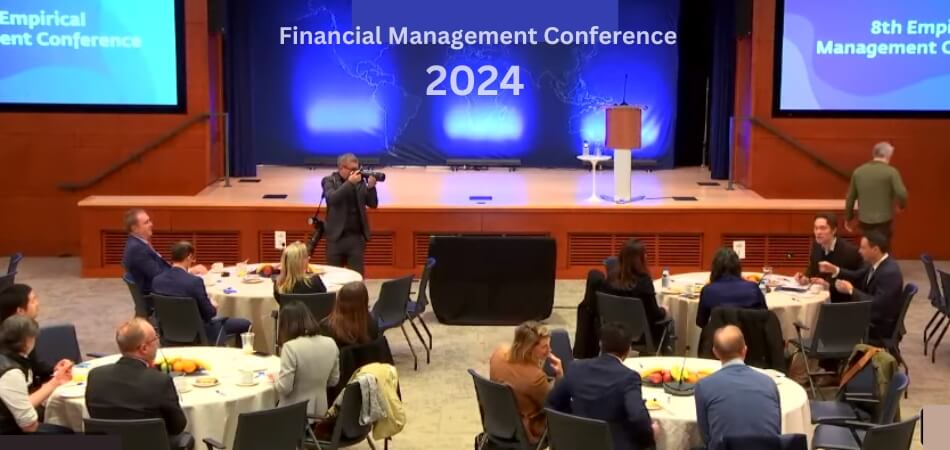Financial Management conferences are the hub of innovation and connection in the world of finance. Within these events, industry professionals from across the globe converge, making them a powerhouse for networking and education. You might find yourself pondering, “Why should you attend a Financial Management conference?”
Simply put, they offer an unmatched opportunity to meet like-minded individuals, expand your professional network, deepen your industry knowledge, and gain insights into global economic trends. By attending, you are placing yourself at the forefront of financial evolution.
Keen to uncover more benefits and learn how these conferences can propel your career forward? Keep reading, as we delve into the myriad of reasons these summits are indispensable for any finance professional.
A Quick Overview of Financial Management Conference
Global Financial Management Conference present an unmissable opportunity for industry experts and newcomers alike to foster professional growth. These gatherings are catalysts for innovation, offering a deep dive into the latest market trends and strategies. They act as a nexus for knowledge exchange, network expansion, and career advancement.

At these summits, attendees engage with cutting-edge financial theories and practices, shared by thought leaders. Networking is another key takeaway, as advisors mix with peers, potential mentors, and industry influencers. Moreover, such events often spotlight emerging global financial patterns, aiding advisors in staying ahead.
The interactive workshops and panels at these conferences are a draw, offering actionable insights and skills enhancement. Here, financial advisors can also discover new tools and resources, essential for thriving in today’s dynamic economic landscape. Each conference serves as a stepping stone towards a more profound understanding of financial management complexities.
Why Should You Attend a Financial Management Conference?
Financial Management conferences are a powerhouse for professional enrichment, providing a unique blend of learning, networking, and growth opportunities. They are crucial for anyone looking to stay relevant in the rapidly evolving finance sector.
Here, we explore the top seven reasons to mark the next conference on your calendar:
Enhanced Industry Knowledge
Financial conferences bring the latest industry knowledge straight to your doorstep, often delivered by renowned experts. They cover a breadth of topics, from macroeconomic trends to niche investment strategies. You leave armed with insights that can redefine your approach to financial management.
Attending ensures you’re up-to-date with the latest regulations and compliance requirements. Such knowledge is indispensable for maintaining your professional credibility and service quality. It’s about staying informed and ahead in a compliance-driven industry.
Networking Opportunities
Conferences are goldmines for networking, offering the chance to connect with peers, influencers, and potential clients. The relationships you forge can lead to collaborations, partnerships, or new business opportunities. It’s about who you meet as much as what you learn.
These events often result in a rich exchange of ideas and best practices. You can encounter mentors who provide guidance or peers who become part of your support system. Networking transcends beyond mere introductions, fostering long-term professional relationships.
Learning from Success Stories

Such success stories are not only motivational but also come with practical lessons. They can demonstrate how to overcome common challenges or how to leverage opportunities effectively. Each story adds a layer to your understanding of success in finance.
Access to Innovative Tools and Technology
Conferences showcase the newest tools and tech in the financial industry. You can explore demos, ask questions, and sometimes get hands-on experience. It’s a chance to modernize your practice with the latest innovations.
Technology is reshaping how financial management is done. By attending, you can ensure your toolset remains cutting-edge, giving you a competitive advantage. Staying technologically savvy is no longer optional but essential.
Professional Development
Continuing education sessions at these conferences can count towards your professional certifications. They offer structured learning that complements your practical experience. This commitment to continuous learning is often what distinguishes top financial advisors.
Investing in your professional development also signals to clients your dedication to excellence. It is a tangible way to showcase your commitment to staying informed and competent. Professional growth is an ongoing journey, and conferences are key milestones.
Global Perspective
A financial management conference often features a global perspective on finance and economics. This can broaden your understanding of international markets and cross-border financial planning. Such a perspective is invaluable in an interconnected world economy.
It also allows you to spot international opportunities for your clients or your own investments. Understanding global trends can be the difference between good and great financial advice. An international outlook is crucial for comprehensive financial strategies.
Personal Growth and Inspiration
Stepping out of your daily routine to attend a conference can be invigorating. It offers a fresh environment that can spark creativity and renew your passion for finance. Such personal growth is priceless in maintaining motivation and satisfaction in your career.
Conferences can also remind you of your role in the larger financial community. They reinforce the impact your work has on clients’ lives and the economy. This broader perspective can be profoundly inspiring and renew one’s sense of purpose.
Attending a financial management conference can be a transformative experience, with benefits that extend far beyond the closing session. It’s an investment in yourself, your career, and ultimately, in the service you provide to your clients. The knowledge, connections, and inspiration garnered from these events can be the catalyst for significant professional and personal development. Don’t miss out on the opportunity to grow and be part of the advancing wave of financial expertise.
Types of Financial Management Conferences You Can Attend
Embarking on the quest for professional development in the finance realm reveals a spectrum of conference types. Each kind caters to distinct facets of financial management, inviting professionals to hone their expertise. The landscape is diverse, offering environments from intimate workshops to grand symposiums.
Industry-Specific Conferences
Tailored to sectors like banking, wealth management, or fintech, industry-specific conferences focus on particular finance niches. Here, specialists dive deep into sector trends, challenges, and innovations. Sessions are crafted to address the unique needs and opportunities within these specific areas. They foster a concentrated learning experience for professionals committed to a particular finance sector.
General Finance Summits
Broad in scope, general finance summits attract a wide array of finance professionals. These events offer a panoramic view of the financial world, encompassing various topics from investment to risk management. Attendees benefit from a holistic understanding of the financial landscape, observing how different fields intersect and influence one another. These summits are ideal for those seeking a comprehensive update on the finance industry.
Technology and Innovation Forums
Focusing on the digital evolution of finance, technology and innovation forums are hotspots for the tech-savvy professional. They highlight cutting-edge developments in fintech, blockchain, and artificial intelligence in finance. Participants engage with emerging tech that could disrupt or enhance financial services. Such forums are essential for keeping pace with the digital transformation in finance.
Regulatory and Compliance Seminars
With ever-evolving regulations, these seminars provide crucial updates on compliance requirements and best practices. They offer guidance on navigating the complex landscape of financial regulation. Experts in law and finance discuss changes and strategies for adherence to regulatory standards. These seminars are key for professionals aiming to safeguard their practices against regulatory risks.
Investment and Wealth Management Conferences
Targeting the dynamic field of asset management, these conferences delve into strategies for investment and wealth preservation. Sessions may cover topics from portfolio diversification to retirement planning. Attendees gain insights into managing wealth effectively for clients or personal investments. They are fundamental for professionals guiding others in wealth accumulation and management.
International Finance and Economics Conferences
Such conferences provide a global perspective on finance, discussing international markets and economic policies. They explore the impact of geopolitical events on financial stability and growth. Attendees learn about cross-border investment opportunities and international risk assessment. These events are invaluable for finance professionals operating in or considering entry into global markets.
Academic and Research Symposia
Ideal for those interested in the theoretical underpinnings of finance, these symposia focus on scholarly research and academic advances. They encourage the exchange of innovative ideas and empirical research findings. Participants include a mix of academics, students, and professionals keen on the science of finance. Such events bridge the gap between academic inquiry and practical financial application.
Diverse in their themes and offerings, financial management conferences provide rich soil for the seeds of knowledge to grow. From the specialist seeking depth to the generalist seeking breadth, these events promise a harvest of insight and opportunity. As the financial landscape evolves, these conferences stand as beacons of learning, ensuring professionals are not only well-informed but also well-equipped to navigate the future of finance.
Who Attends the Financial Management Conference?
Financial Management Conferences cast a wide net, drawing in a diverse pool of attendees all united by the finance thread. From fresh-faced novices to seasoned gurus, these gatherings are melting pots of expertise and experience. The convergence of such varied participants fuels a dynamic exchange of insights and ideas.
Financial Advisors and Planners
Dedicated financial advisors and planners frequent these conferences to refine their advisory skills and stay current with industry shifts. They leverage the knowledge gained to better serve their client base with updated strategies. Networking with peers is a crucial benefit for them, opening doors to new client referrals and partnerships.
Investment Bankers
Investment bankers tend to scout for emerging market trends and potential investment opportunities. These conferences serve as their compass, guiding them through the complexities of market fluctuations and investment vehicles. The cutting-edge insights gleaned here directly influence their deal-making strategies and client recommendations.
Fintech Innovators
Creators and enthusiasts of financial technology find these conferences to be showcases of the latest in fintech evolution. They come to explore new tools, platforms, and advancements that could disrupt traditional financial paradigms. Collaboration with financial experts helps them tailor their innovations to the market’s needs.
Regulatory and Compliance Officers
These professionals seek clarity and updates on the labyrinth of financial regulations that govern the industry. The conferences act as a forum for them to decipher new legislation and compliance tactics. Exchanging notes with contemporaries, they strategize on implementing regulations within their organizations effectively.
Academic Scholars
Scholars from academic institutions immerse themselves in these conferences to share research findings and gather fresh data. They contribute to the dialogue with their latest academic insights, enriching the collective understanding. These conferences serve as a bridge between theoretical research and its practical applications in finance.
Corporate Treasurers and CFOs
Corporate treasurers and Chief Financial Officers (CFOs) look to optimize their organizations’ financial health through strategic insights gained at these events. They evaluate new tools for cash management, risk assessment, and investment decision-making. Learning about macroeconomic trends also aids them in forecasting and planning for their companies’ futures.
Students and New Entrants
Students and new entrants come hungry to learn, seeking guidance and mentorship from established professionals. They attend to get a realistic view of the finance industry and its career pathways. These conferences often mark the beginning of their professional journeys in finance.
The demographic tapestry of a Financial Management Conference is as rich and varied as the financial sector itself. Each attendee brings a unique perspective, crafting a multidimensional learning and networking experience. It’s this diversity that fuels the comprehensive growth and vibrancy of these essential professional gatherings, ensuring that every participant, regardless of their role, finds value and opportunity in attendance.
Tips to Find the Right Financial Management Conference
Identifying the right conference can significantly impact your career trajectory and professional development. Here’s how to discern which conference aligns best with your professional goals and interests:
- Define Your Objectives: Clearly articulate your reasons for attending a conference. Whether it’s networking or learning specific skills, your goal will guide your choice.
- Research Speakers and Content: Investigate the event’s agenda and speaker list. Top-tier experts and relevant topics are indicators of a valuable conference.
- Check Attendee Demographics: Look at the profiles of past attendees. Aligning with professionals at similar career stages or with shared objectives can enhance your experience.
- Consider the Location: Factor in the convenience and allure of the conference location. A desirable destination can make the experience more enjoyable and rewarding.
- Evaluate the Format: Some prefer large expos, while others benefit from intimate workshops. Choose a format that suits your learning style and comfort level.
- Assess Networking Opportunities: Ensure there are structured networking sessions. Quality interactions often lead to lasting professional relationships and opportunities.
- Look for Continuing Education: If you need to maintain professional credentials, search for conferences offering CE credits. This can be a practical and efficient way to meet your requirements.
- Read Reviews and Testimonials: Seek out feedback from previous participants. Honest reviews can provide insight into the conference’s real-world value.
- Balance Cost and Benefit: Weigh the registration fee against the potential benefits. An expensive conference might be worth it if the ROI in knowledge and connections is high.
The right financial management conference can be a goldmine of opportunities for career advancement and personal growth. With these tips, you can select a conference that not only meets your expectations but also offers a return on your investment through invaluable knowledge, networking, and professional development.
Bottom Lines
Facing the complexities of today’s financial landscape can leave professionals seeking clarity and advancement in a sea of information. That’s precisely why should you attend a Financial Management conference.
It offers a solution, a hub for networking with like-minded experts, gaining industry insights, and staying abreast of emerging trends. Attending such a conference addresses the pain of feeling out of the loop in a fast-evolving field, providing actionable strategies to enhance your practice. The consequence of seizing this opportunity is a sharper competitive edge and a deeper understanding of financial intricacies that can propel your career to new heights.






